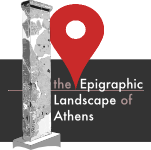Cf. Ath.Agora 3 95 and 208 no. 262Wycherley R., «The Athenian Agora III. Literary and Epigraphical Testimonia», Princeton 1957, Dio Cass. 47, 20, 4Dio Cassius, «Rhomaike Historia» (testimonium)
Inv. number
Translations
AIO, AXON, IG Online
Images
Aleshire, Imaging Inscriptions, OSU Squeeze Collection, UBC Epigraphic Squeezes, ASCSA Net
Description
Date
44-43 BCE
Period: 1st century BCE --> second half
Reasons: historical context, prosopography
See notesThe dedication of a statue to Cassius should be placed at the times of Cassius' and Brutus' flight from Rome to the East after Caesar's murder or soon after.
Text category
honorific dedication (tabula honoraria)
See notesWe may presume that the formula of the honorific dedication for Cassius paralleled that one set up for Brutus at the same moment (SEG 17, 75Supplementum Epigraphicum Graecum = ELA id: 407). The monument for Cassius was thus probably awarded by the Demos of Athens.
Monument description
Monument type: base
See notesDio Cass. 47, 20, 4Dio Cassius, «Rhomaike Historia» reported that both Brutus and Cassius were granted bronze images in Athens near those of Harmodios and Aristogeiton, being thus compared to the Tyrannicides and regarded as heroes. It is not clear if Cassius actually visited the city along with Brutus (Habicht 1995 (2 éd., 2006) 391-392Habicht Ch., «Athènes hellénistique. Histoire de la cité d'Alexandre le Grand à Marc Antoine», 2 éd. revue et augmentée, Paris 2006 believe so), but the two were certainly honoured side by side in the "asty".
Cf. Raubitschek 1959 21Raubitschek A. E.,«The Brutus Statue in Athens», in « Atti del III Congresso Internazionale di Epigrafia Greca e Latina (Roma, 4-8 settembre 1957», Roma 1959, 15-21 + tavv. III-VII on the possibility that the Athenians only reinscribed the bases of one of the two groups portaiting Harmodios and Aristogeiton in honour of Brutus and Cassius.
Physical features
Signs of reuse: Perhaps reused "in situ" for Cassius (?)
Findspot
Circumstances: literary source
Original location
✓uncertain
See notesCf. SEG 17, 75Supplementum Epigraphicum Graecum = ELA id: 407; Krumeich - Witschel 2009 208-209Krumeich R., Witschel Ch.,«Hellenistiche Statuen in ihrem räumlichen Kontext: Das Beispiel der Akropolis und der Agora von Athen», in A. Matthaei, M. Zimmermann (hrsg.), « Stadtbilder im Hellenismus», Berlin 2009, 173-226


